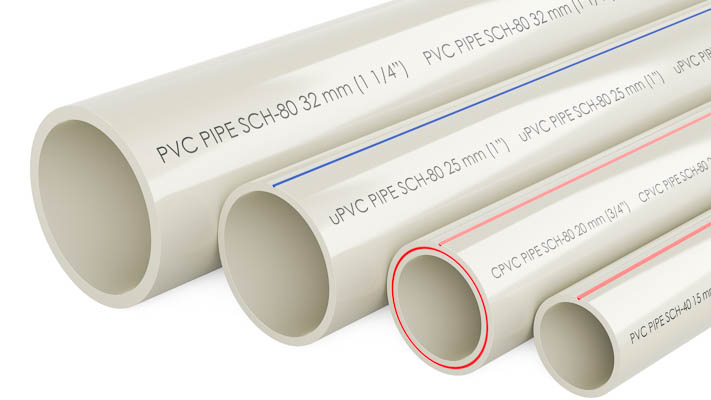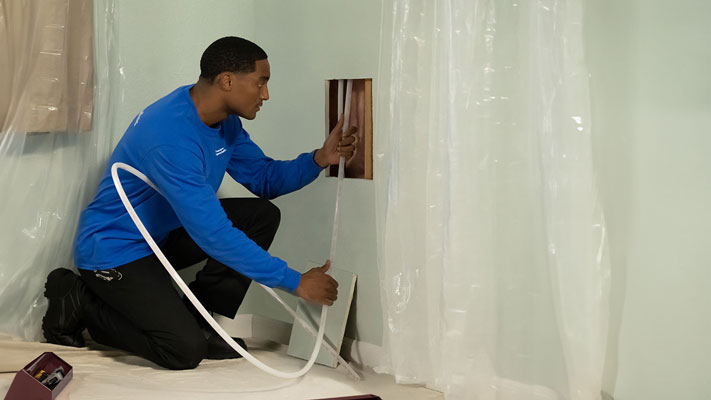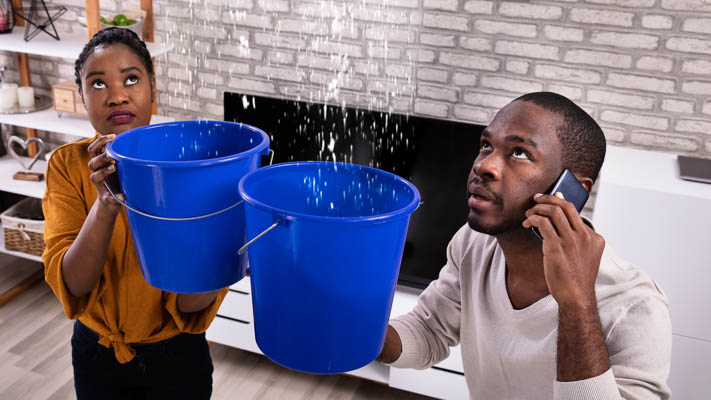CPVC: What Is It and Where Is It Used?
CPVC stands for chlorinated polyvinyl chloride, a thermoplastic material commonly used to make pipes and fittings for hot and cold water systems. CPVC pipes are an alternative to traditional copper and galvanized steel pipes because they are more affordable, lightweight, and easy to install.
CPVC was first introduced in the 1950s by adding chlorine to the materials used to produce PVC (polyvinyl chloride) pipes. By adding chlorine molecules to a base of PVC, CPVC pipes can handle much higher pressures and temperatures.

Most CPVC pipes can handle temperatures up to 200 degrees Fahrenheit, making them ideal for use in hot water systems, such as those found in homes, commercial buildings, and industrial settings. We have an article that focuses on what CPVC piping is.
CPVC pipes are also resistant to corrosion, which can prolong their lifespan compared to galvanized plumbing, which corrodes over time and Kitec plumbing and their defective fittings.
How Can I Tell If I Have CPVC Pipes?
If you're not sure whether your home or building has CPVC pipes installed, there are a few quick and easy ways to check:
- Look for markings on the pipes: CPVC pipes are usually marked with the letters "CPVC" or "CPC" along the length of the pipe. You can also check for other markings or codes that may indicate the type of pipe.
- Check the color of the pipes: CPVC pipes are typically light yellow or beige, although they can also be gray or white. If your pipes are a different color, they may not be CPVC.
- Check the temperature rating: CPVC pipes are designed to withstand higher temperatures than PVC pipes. If your pipes are rated for use at temperatures above 140°F, they may be CPVC.
For more information, check out our article that breaks down the key differences between CPVC and PVC pipes.
Get your free estimate today
With over 75,000 repipes completed, we've perfected our One-Stop Repipe™ for your home.
What Common Problems Arise from CPVC Piping?
There are a number of problems that may arise from CPVC plumbing:
- Thermal expansion: CPVC pipes can expand and contract with changes in temperature, which may cause stress on the joints and fittings, leading to leaks or joint failures. This is especially problematic in areas with large temperature fluctuations.
- Brittleness of pipes: CPVC pipes can become brittle over time, especially when exposed to UV light or high chlorine levels. Brittle pipes may crack or break, causing leaks and water damage.
- Chemical reaction: CPVC plumbing is not resistant to certain chemicals. Some chemicals and solvents can react with the pipes, causing damage or deterioration.
- Glue loosening: Most CPVC pipes are connected using glue. Over time, glue can loosen due to contact with chemicals or temperature fluctuations, which can lead to cracks and further leaks or breakages.
What Are the Benefits of PEX Tubing Over CPVC Pipes?
PEX (cross-linked polyethylene) pipes are often preferred over CPVC (chlorinated polyvinyl chloride) for several reasons:
- Flexibility: PEX tubing is flexible and can be bent and curved without the need for fittings, making it easier and faster to install in tight spaces. CPVC, on the other hand, is rigid and requires more fittings and joints, which can increase the risk of leaks.
- Durability: PEX is highly durable and resistant to corrosion and freezing, making it less likely to develop leaks or burst in extreme temperatures. CPVC, while durable, is more prone to damage from freezing or extreme temperature changes, becoming brittle over time.
- Cost: PEX is generally less expensive than CPVC, as it requires fewer fittings and less labor to install.
- Health and Safety: In comparison to CPVC, PEX tubing is considered much safer, as it does not contain harmful chemicals or additives that can leach into the water supply.
- Longevity: PEX typically lasts 50 years or more, compared to CPVC, which normally lasts between 25 and 40 years. This means homeowners are less likely to need to replace their plumbing systems due to wear and tear.

Overall, PEX tubing is a more versatile, durable, and cost-effective option for plumbing systems than CPVC.
While CPVC has been a popular choice for many years, the advantages of PEX tubing have made it a preferred option for many homeowners and contractors.
How Much Does It Cost to Replace CPVC with PEX Tubing?
The cost to replace CPVC with PEX tubing will vary depending on several factors, such as the size of the area being repiped, the number of plumbing fixtures, the accessibility of the pipes, and the complexity of the installation.
For a small house or apartment, the cost to replace your CPVC with PEX tubing may range from around $4,500 to $15,000 for a larger home. We have an in-depth article about the cost of replacing CPVC with PEX tubing.
It's important to note that these are just rough estimates, and the actual cost of replacing CPVC with PEX tubing will depend on the specific circumstances of your situation.
Contact us today to receive a free consultation from one of our local repipe consultants. We would be more than happy to provide a free, fixed-price quote.
Get a Free Quote to Replace Your CPVC with New PEX
Here at Repipe Specialists, we've replaced CPVC plumbing in homes across the United States using Uponor PEX-A tubing. We continually get positive customer feedback from customers about their overall home repipe experiences. We often exceed their expectations on:
- Speed: Our repipe crews typically complete a repipe in a day, returning on another day for wall patching.
- Convenience: Through our One-Stop Repipe™ process, we handle everything from permits, to wall patching, to inspections.
- Cleanliness: Our crews are trained to protect your home while working (we cover all surfaces with protective sheeting), and to clean up fully at the end of each day.
- Peace of Mind: Repipe Specialists is a fully licensed plumber in every state we operate in, and we back all of our repipes with a lifetime warranty.
- Financing programs: To help take the sting out of unplanned repipe expenses, we offer several financing programs.
- Price: As a specialist that performs hundreds of repipes a week, we can deliver high-quality repipes at a lower cost vs generalist plumbers. We have an article that covers repipe cost factors in detail.
Schedule a free in-home consult, and one of our local repipe consultants will explain all your repipe options and provide you with a written, fixed-price quote.

